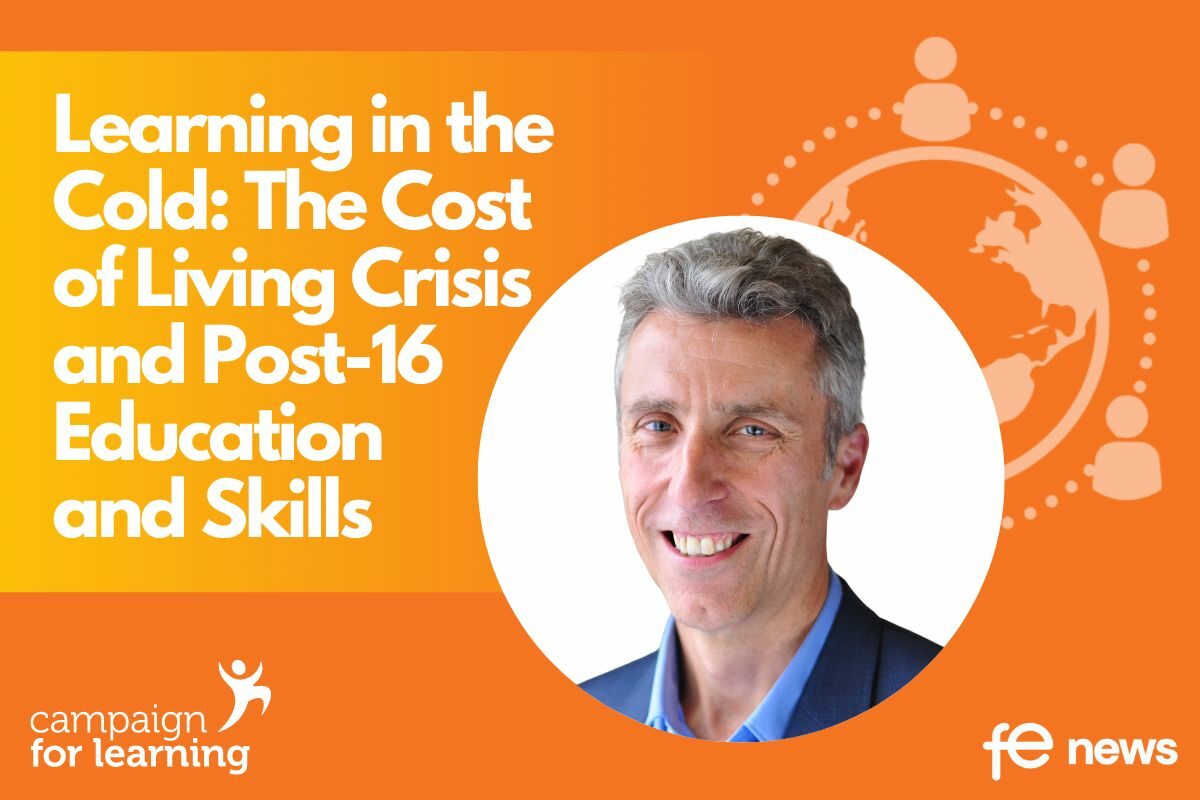The Cost-of-Living Crisis and FE Colleges

We really are living through extraordinary and challenging times. After a dozen years of funding cuts, colleges were starting to believe that we had turned a corner with last year’s spending review offering three years of higher funding for 16-to-19 year-olds. The cost-of- living crisis has crushed that optimism, with energy costs alone increasing from about 2% of college income pre-Covid to around 6%, and potentially more next year.
FE Colleges and the Energy Bill Relief Scheme
The non-domestic energy relief scheme helps some colleges but only for 6 months – so we are fighting hard to make the case that colleges will require energy costs support beyond April 2023. College leaders are a creative and pragmatic bunch, so they are working hard to minimise the impact, but the scale of the increase means a range of big impacts whatever they do.
FE Staff and the Energy Crisis
Equally, our staff increasingly face hardships in simply heating and eating, and with interest rates rising, paying the rent or the mortgage comes on top of everything else. When he was Chancellor over the summer, Nadhim Zahawi admitted that even for those “…on £45,000 a year, you’re having your energy bills go up by 80% and will probably rise even higher in the new year – it’s really hard.” With most college staff and students from households earning often much less, colleges are communities full of people struggling financially.
The FE Doom Loop
So, as energy costs and inflation bite harder, staff pay lags even further behind. Given that around two thirds of spend is on staff, the pressure on pay is enormous, just at the time when staff themselves are facing household energy, rent, mortgage, food, fuel, travel and other costs rising too.
Recruiting new people and retaining staff becomes a central challenge, with colleges now reporting that they cannot meet demand in key subjects such as construction, engineering, health and digital – all sectors facing their own difficulties in recruiting skilled people. Ultimately, this is a barrier to economic growth.
Staying Financially Healthy Whilst Thinking the Unthinkable
There are no easy ways through this for college leaders and their boards. Every decision they need to take to stay solvent, which they are required to do, will create more pain somewhere. But it is critical that FE colleges stay financially healthy. Nobody predicted the level of increase when colleges were setting their budgets in July, so colleges have to find extra funds in-year to cope with inflation and energy costs. That’s why many are thinking the almost unthinkable – from lowering the thermostat to 19 degrees to closing buildings, reducing opening hours, and even supplying blankets for classrooms.
Support for FE Colleges as Employers
A positive step the DfE could take is to support capital investment in energy efficient buildings and green energy, something we are urging them to make happen.
We also continue to press the DfE and Treasury to reimburse VAT which might bring in around £200m for colleges and for support on staff pay, particularly in skills shortage areas such as construction, engineering and health. Our evidence to them shows that colleges are now failing to meet demand for learning in these areas because they cannot recruit staff to teach. That will hamper economic growth in many sectors with their own recruitment difficulties. Our message seems to have got through and is being discussed.
Support for FE Students
Support for students is also vital. We’re hearing more anecdotal evidence of young people taking full-time jobs rather than staying in learning because they need to supplement the household income.
College bursary funds were inadequate before this crisis, but have been stretched beyond breaking point. It’s simply not fair that some young people have to make the decision to leave education for financial reasons and we should do everything we can to stop that happening.
Open to Business, Open for Students
So, it’s as tough as ever on the financial front for colleges, for staff and for students. And yet, students are being enrolled, courses are commencing, and great teaching and learning is going on all over the country. Colleges will still be vibrant and positive. They will continue to have an enormous positive impact because college leaders and staff believe in what they do and work their socks off to support their students. But the cracks are opening up and without more funding very soon, people will be falling through them.
Recommendation 1
The Government should reimburse VAT for colleges to bring them into line with schools, immediately returning about £210m to support pay, solvency and learning.
Recommendation 2
DfE should boost bursary funds for 16-19 and adult students and apprentices to support their travel, food and other costs, so that they can afford to stay in learning.
Recommendation 3
DfE should re-visit the spending review funding rates for 16-to-19 study programmes, adult education budget and apprenticeships, and uprate in line with inflation so that skills can play a central role in any strategy for growth.
By David Hughes, Chief Executive, AoC
This article is part of Campaign for Learning’s series: Learning in the cold: The Cost-of-Living Crisis and Post-16 Education and Skills
Order of series
Day 1
Friday 21st October
- Louise Murphy, Economist, Resolution Foundation: The Cost-of-Living and the Energy Crisis for Households
- James Kewin, Deputy Chief Executive, Sixth Form Colleges Association: The Cost-of-Living Crisis and 16-19 Year-Olds in Full-Time Further Education
Day 2
Saturday 22nd October
- Becci Newton, Public Policy Research Director, Institute for Employment Studies: The Cost-of-Living Crisis and 16-18 Year-Olds in Jobs with Apprenticeships
- Zach Wilson, Senior Analysis Officer and Andrea Barry, Analysis Manager, Youth Futures Foundation: The Cost-of-Living Crisis and 16-24 Year-Olds ‘Not in Full-Time Education’
Day 3
Monday 24th October
- Nick Hillman, Director, Higher Education Policy Institute: The Cost-of-Living Crisis and Full-Time and Postgraduate Higher Education
- Liz Marr, Pro-Vice Chancellor – Students, The Open University: The Cost-of-Living Crisis and Part-Time Higher Education in England
Day 4
Tuesday 25th October
- Steve Hewitt, Further Education Consultant: The Cost-of-Living Crisis: Access to HE and Foundation Year Programmes
- Sophia Warren, Senior Policy Analyst, Policy in Practice: The Cost-of-Living Crisis, Universal Credit, Jobs and Skills Training
Day 5
Wednesday 26th October
- Paul Bivand, Independent Labour Market Analyst: Economic Inactivity by the Over 50s, the Cost-of-Living Crisis and Adult Training
- Aidan Relf, Skills Consultant: The Cost-of-Living Crisis and Employer Demand for Level 2-7 Apprenticeships
Day 6
Thursday 27th October
- Mandy Crawford-Lee, Chief Executive, UVAC: The Cost-of-Living Crisis and Employer Demand for Level 4+ Apprenticeships and Part-Time Technical Education
- Simon Parkinson, Chief Executive, WEA: The Cost-of-Living Crisis and Adult Community Learning
Day 7
Friday 28th October
- David Hughes, Chief Executive, AoC: The Cost-of-Living Crisis and FE Colleges
- Jane Hickie, Chief Executive, AELP: The Cost-of-Living Crisis and Independent Training Providers
Day 8
Saturday 29th October
- Susan Pember, Policy Director, HOLEX: The Cost-of-Living Crisis and Adult Education Providers
- Martin Jones, Vice-Chancellor and David Etherington, Professor of Local and Regional Economic Development, Staffordshire University: The Cost-of-Living Crisis – The Response of Staffordshire University
- Chris Hale, Policy Director, Universities UK: The Cost-of-Living Crisis and Universities











Responses